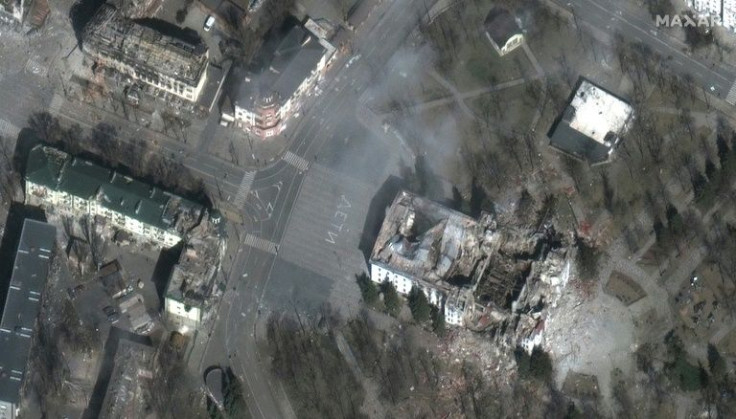Survivors Of Mariupol Theatre Strike Recall 'Horror' Of Strike
Two women that survived the Russian airstrike on a theatre sheltering civilians in Ukraine's besieged city of Mariupol earlier this month told AFP about the "horror" they endured.
Viktoria Dubovytskaya was inside the Mariupol drama theatre when it was hit on March 16. Maria Kutnyakova -- who left the theatre to get water the day of the shelling -- witnessed the strike from outside, while her mother and sister were still in the building.
The two residents of the besieged port city are now refugees on the other side of Ukraine, in the western city of Lviv, where they spoke to AFP about the minutes before and after the bombing, which Kyiv blames on Russia.
Mariupol has suffered near total destruction since Moscow's invasion of Ukraine.
An estimated 160,000 people remain trapped in the southeastern city, with many left without food in the cold.

Looking to escape the shelling and bombing, hunger and cold, Viktoria Dubovytskaya had taken refuge in the theatre on March 5 with her two young children.
She thought she could then find an evacuation convoy to join with her two-year-old daughter Anastasia and six-year-old son Artyom.
The day the drama theatre was shelled began calmly.
The two children were playing near their mother when the bomb crashed into the building.
Dubovytskaya was thrown against the wall and injured her face. She immediately heard her son scream, but not her daughter.
"It was the most frightening moment, when you think that she's not there anymore," the 24-year-old recalled, two weeks on, as she held her daughter in a shelter in Lviv.
"You hope that maybe she is without arms or legs, but at least alive."
According to satellite images of the theatre and witness testimony collected by AFP, the word "deti" ("children" in Russian) had been painted in large white letters in front and behind the theatre.

Authorities said 1,000 people were inside the theatre at the time of the strike, mostly women and children.
It is still unknown how many people were killed in the strike.
Mariupol city hall put the figure at 300, citing witnesses.
"Everyone knew that there were children in the theatre, even my husband whom I could not contact because there was no reception," said Dubovytskaya.
Her husband was working in neighbouring Poland when Moscow launched its invasion of Ukraine. He came to pick them up in Mariupol after the strike.
"I was going there and I did not know if they were alive or not, but I had hope," Viktoria's husband Dmitry told AFP.

Like Dubovytskaya, Maria Kutnyakova, a communications manager at a start-up in Mariupol, also hoped to join a humanitarian convoy at the drama theatre with her mother and sister.
The family had run out of food and water after a strike on March 10 took out most of their apartment's kitchen and bathroom, as well as killing a neighbour.
The theatre was meant to be a starting point for evacuations via an official humanitarian convoy.
It also became a rallying point for individuals hoping to try their luck in their own convoys, according to the two Mariupol residents.
Russia alleges that the theatre had housed soldiers from the nationalist Azov battalion.
But the two witnesses told AFP that no soldier was in the theatre at the time of the airstrike.
"The soldiers came once a day to announce if there would be a humanitarian convoy and then left immediately," said Viktoria Dubovytskaya.
She specified that only once, four Ukrainian soldiers spent the night there, after a nearby bombing.
On March 16, Maria, her sister and her mother moved to the third floor of the theatre, due to a lack of space on the lower floors and in the basement.
When she went to get water from her uncle in the next building, she heard a plane flying and then the bomb being dropped.
"When I came closer, I saw that the theatre did not have a roof anymore. The debris and wounded were there," she said, still in shock, now speaking from a theatre in Lviv where she is taking refuge after a three-day journey out of Mariupol.
When she went inside the bombed theatre, she heard desperate calls of first names in the rubble, of people looking for their loved ones.
To find her mother and sister, the 30-year-old screamed out their last name.
They had "miraculously" survived.
Both the women got stuck in the theatre after the strike.
"Outside, the Russians continued to shoot and inside, the building was burning," said Kutnyakova.
She then ran to another improvised shelter and the local philharmonic nearby. It was also bombed the same evening.
Homeless and without shelter, the family decided to embark on a risky journey "to finally be in a place where the ceiling won't fall on our heads."
It was on the way out of Mariupol that Dubovitskaya saw the extent of the city's destruction.
She said bodies lay in the rubble, sometimes small wooden crosses planted in the ground.
© Copyright AFP {{Year}}. All rights reserved.



















